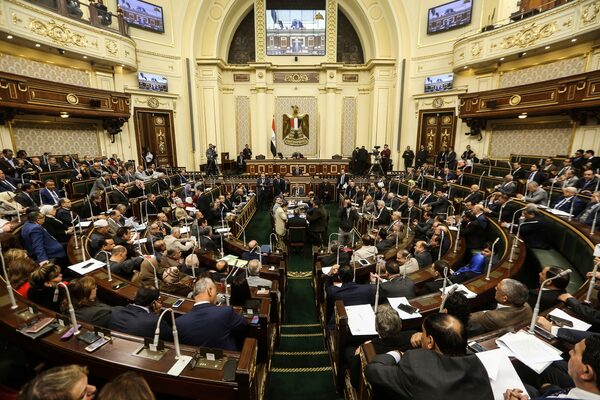
In this Feb. 13, 2019, file photo, Egypt's parliament meets in Cairo.The Associated Press
Egypt’s parliament on Monday authorized the deployment of troops outside the country, a move that could escalate the spiralling war in Libya after the President threatened military action against Turkish-backed forces in the oil-rich country.
A troop deployment in Libya could bring Egypt and Turkey, close U.S. allies that support rival sides in the conflict, into direct confrontation.
President Abdel Fattah el-Sissi has called the strategic coastal city of Sirte a “red line” and warned that any attack on the city, which sits near Libya’s main oil-export terminals and fields, would prompt Egypt to intervene to protect its western border.
Turkish-backed forces allied with the UN-supported government in Tripoli, the capital, are mobilizing on the edges of Sirte and have vowed to retake the Mediterranean city, along with the inland Jufra air base, from rival forces commanded by Khalifa Hifter and based in the east.
After a closed-door session in Cairo, Egypt’s House of Representatives, which is packed with supporters of Mr. el-Sissi, approved plans to send troops to “defend Egyptian national security in the strategic western direction against the actions of armed criminal militias and foreign terrorists.”
The size and nature of the military deployment was unclear.
Libya was plunged into chaos when a NATO-backed uprising in 2011 toppled long-time dictator Moammar Gadhafi, who was later killed.
Drawn by Mr. Hifter’s anti-Islamist stance, Egypt, the United Arab Emirates and other foreign powers have provided his forces with critical military assistance against western militias. Russia has also emerged as a key supporter of Mr. Hifter, sending hundreds of mercenaries through Wagner Group, a private military company.
Turkey, a bitter rival of Egypt in a broader regional struggle over political Islam, is the main patron of the Tripoli forces, which are also backed by the wealthy Gulf state Qatar.
“Egypt will spare no efforts to support the sister Libya … to overcome the current critical crisis,” the Egyptian presidency said in a statement after a meeting of the National Defence Council on Sunday that was chaired by Mr. el-Sissi.
Egypt has been under pressure to act since the collapse this spring of Mr. Hifter’s 14-month campaign to oust the UN-supported government from the capital. Tripoli forces drove Mr. Hifter’s self-styled army from the capital’s suburbs, several western towns and a key air base.
The string of victories provoked intense fears in Egypt, which sees a Turkish presence on its porous western border as a threat. Relations between the countries have steadily deteriorated since 2013, when Mr. el-Sissi led the military overthrow of Mohamed Morsi, an elected Islamist leader who enjoyed Turkey’s support.
Egypt’s state-run Al-Ahram daily reported on Sunday that the vote in parliament was intended to mandate Mr. el-Sissi to “intervene militarily in Libya to help defend the western neighbour against Turkish aggression.”
Libya’s east-based parliament, the sole elected body in the country, urged Egypt to send troops. Last week, Mr. el-Sissi hosted dozens of tribal leaders loyal to Mr. Hifter in Cairo, where he repeated that Egypt will “not stand idle in the face of moves that pose a direct threat to security.”
But Mr. el-Sissi has also pushed hard in recent weeks for a ceasefire and political settlement. The Egyptian military, which has for years steered clear of overseas adventures and focused on fighting Islamic militants in the Sinai Peninsula, may be wary of deep involvement in Libya’s chaotic conflict.
The “distinct possibility” of direct conflict between Egypt and Turkey, a NATO member, presents a “brand new headache for Washington,” said Jalel Harchaoui, a research fellow specializing in Libyan affairs at the Clingendael Institute, an independent think tank in the Netherlands.
The U.S. has sent mixed signals to the rival sides over the course of the war. Although increasingly concerned about Moscow’s growing influence in Libya, Washington “doesn’t want to articulate a real, coherent Libya policy,” Mr. Harchaoui said, leaving a void that has allowed Russia and Turkey to become major players.
In a call on Monday with U.S. President Donald Trump ahead of the parliament vote, Mr. el-Sissi said Egypt’s aim is to “prevent further deterioration of security in Libya,” according to a statement from the Egyptian presidential spokesman. It said the two leaders agreed on maintaining a ceasefire and avoiding a military escalation in Libya.
Stephanie Williams, acting head of the UN support mission in Libya, on Monday also pushed the warring sides and their foreign backers to pull back from the brink, “to spare the 125,000 civilians who remain in harm’s way.”
Our Morning Update and Evening Update newsletters are written by Globe editors, giving you a concise summary of the day’s most important headlines. Sign up today.